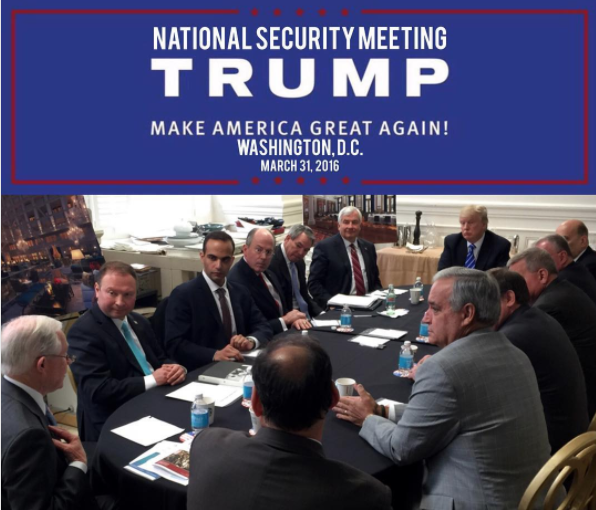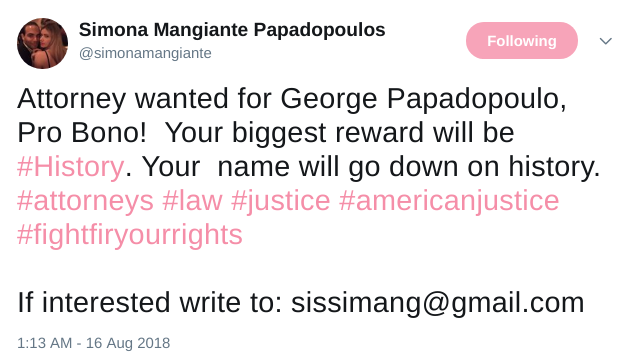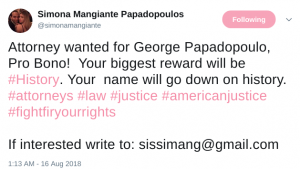George Papadopoulos’ Changing Tune about Working for Trump
I want to point out a small discrepancy in George Papadopoulos’ story about his ties to Sergei Millian. The Mueller Report notes that, when Millian started pitching business deals to Papadopoulos the day after the election, he cooled when Papadopoulos said ht wasn’t really interested in working in the Administration. Remember: Millian was pitching Papadopoulos on an arrangement where he’d get monthly fees while working in the Administration.
The Office investigated another Russia-related contact with Papadopoulos. The Office was not fully able to explore the contact because the individual at issue-Sergei Millian-remained out of the country since the inception of our investigation and declined to meet with members of the Office despite our repeated efforts to obtain an interview. Papadopoulos first connected with Millian via Linkedln on July 15, 2016, shortly after Papadopoulos had attended the TAG Summit with Clovis.500 Millian, an American citizen who is a native of Belarus, introduced himself “as president of [the] New York-based Russian American Chamber of Commerce,” and claimed that through that position he had ” insider knowledge and direct access to the top hierarchy in Russian politics.”501 Papadopoulos asked Timofeev whether he had heard of Millian.502 Although Timofeev said no,503 Papadopoulos met Millian in New York City.504 The meetings took place on July 30 and August 1, 2016.505 Afterwards, Millian invited Papadopoulos to attend-and potentially speak at-two international energy conferences, including one that was to be held in Moscow in September 2016.506 Papadopoulos ultimately did not attend either conference.
On July 31 , 2016, following his first in-person meeting with Millian, Papadopoulos emailed Trump Campaign official Bo Denysyk to say that he had been contacted “by some leaders of Russian-American voters here in the US about their interest in voting for Mr. Trump,” and to ask whether he should “put you in touch with their group (US-Russia chamber of commerce).”507 Denysyk thanked Papadopoulos “for taking the initiative,” but asked him to “hold off with outreach to Russian-Americans” because “too many articles” had already portrayed the Campaign, then-campaign chairman Paul Manafort, and candidate Trump as “being pro-Russian.”508
On August 23, 2016, Millian sent a Facebook message to Papadopoulos promising that he would ” share with you a disruptive technology that might be instrumental in your political work for the campaign.”509 Papadopoulos claimed to have no recollection of this matter.510
On November 9, 2016, shortly after the election, Papadopoulos arranged to meet Millian in Chicago to discuss business opportunities, including potential work with Russian “billionaires who are not under sanctions.”511 The meeting took place on November 14, 2016, at the Trump Hotel and Tower in Chicago.512 According to Papadopoulos, the two men discussed partnering on business deals, but Papadopoulos perceived that Millian’s attitude toward him changed when Papadopoulos stated that he was only pursuing private-sector opportunities and was not interested in a job in the Administration.513 The two remained in contact, however, and had extended online discussions about possible business opportunities in Russia. 514 The two also arranged to meet at a Washington, D.C. bar when both attended Trump’s inauguration in late January 2017.515
500 7/15/16 Linkedln Message, Millian to Papadopoulos.
501 7 /15/16 Linkedln Message, Millian to Papadopoulos.
502 7/22/16 Facebook Message, Papadopoulos to Timofeev (7:40:23 p.m.); 7/26/16 Facebook Message, Papadopoulos to Timofeev (3:08:57 p.m.).
503 7/23/16 Facebook Message, Timofeev to Papadopoulos (4:31:37 a.m.); 7/26/16 Facebook Message, Timofeev to Papadopoulos (3:37: 16 p.m.).
504 7/16/16 Text Messages, Papadopoulos & Millian (7:55:43 p.m.).
505 7/30/16 Text Messages, Papadopoulos & Millian (5:38 & 6:05 p.m.); 7/31/16 Text Messages, Millian & Papadopoulos (3:48 & 4:18 p.m.); 8/ 1/16 Text Message, Millian to Papadopoulos (8:19 p.m.).
506 8/2/16 Text Messages, Millian & Papadopoulos (3 :04 & 3 :05 p.m.); 8/3/16 Facebook Messages, Papadopoulos & Millian (4:07:37 a.m. & 1:11:58 p.m.).
507 7/31/16 Email, Papadopoulos to Denysyk (12:29:59 p.m.).
508 7 /31/16 Email, Denysyk to Papadopoulos (21 :54:52).
509 8/23/16 Facebook Message, Millian to Papadopoulos (2:55:36 a.m.).
510 Papadopoulos 9/20/17 302, at 2.
511 11/10/16 Facebook Message, Millian to Papadopoulos (9:35:05 p.m.).
512 11/14/16 Facebook Message, Millian to Papadopoulos (1 :32: 11 a.m.).
513 Papadopoulos 9/19/17 302, at 19.
514 E.g., 11/29/16 Facebook Messages, Papadopoulos & Millian (5:09 – 5:11 p.m.); 12/7/16 Facebook Message, Millian to Papadopoulos (5:10:54 p.m.).
515 1/20/17 Facebook Messages, Papadopoulos & Millian (4:37-4:39 a.m.).
The FBI interview where he claimed he didn’t want to work in the Administration was the same one where Papadopoulos, “declined to assist in deciphering his notes, telling investigators that he could not read his own handwriting” from a journal entry showing plans to have a September 2016 meeting with Clovis, Phares, and Putin’s office in September 2016.
But in the sentencing memorandum submitted by his lawyers, Papadopoulos claimed that he had lied to preserve hopes of getting a job in the Administration.
Mr. Papadopoulos misled investigators to save his professional aspirations and preserve a perhaps misguided loyalty to his master.
[snip]
George explained that he was in discussions with senior Trump administration officials about a position and the last thing he wanted was “something like this” casting the administration in a bad light. The agents assured him that his cooperation would remain confidential.
[snip]
George lied about material facts central to the investigation. To generalize, the FBI was looking into Russian contacts with members of the Trump campaign as part of its larger investigation into Russian interference with the 2016 election. This issue had dominated the news for several months with stories concerning Carter Page and Paul Manafort. The agents placed this issue squarely on the table before George and he balked. In his hesitation, George lied, minimized, and omitted material facts. Out of loyalty to the new president and his desire to be part of the administration, he hoisted himself upon his own petard.
That’s not necessarily a conflict. Papadopoulos may have told Millian he didn’t want to work in the Administration just to deflect an offer that was obviously improper. But if that’s why he did it, it would reflect awareness on Papadopoulos’ part that something more than a job offer was on the table, in the same way that he reportedly told Stefan Halper that being involved in the hack-and-leak would amount to treason.
But the discrepancy is significant given that Papadopoulos accused the FBI of making a head fake in his interview by suggesting they wanted to interview him (only) about Millian but instead raising Joseph Mifsud as well.
On the morning of January 27, 2017, as George stepped out of the shower at his mother’s home in Chicago, two FBI agents knocked on the door seeking to interview him. The agents asked George to accompany them to their office to answer a “couple questions” regarding “a guy in New York that you might know[,] [t]hat has recently been in the news.” George thought the agents wanted to ask him about Russian businessman Sergei Millian. Wanting clarification, he asked the agents, “…just so I understand, I’m going there to answer questions about this person who I think you’re talking about.” The agents assured George that the topic of discussion was Mr. Millian who had been trending in the national media.
[snip]
Seemingly as promised, the agents began their questioning about George’s relationship with Sergei Millian. George knew Mr. Millian only as a businessman pitching an opportunity to George in his personal capacity. The agents asked how they first met, what they discussed, how often they talked or met in person, if George knew whether Mr. Millian was connected to Russia or a foreign intelligence service, and who else on Mr. Trump’s campaign may have been in contact with Mr. Millian. George answered their questions honestly.
Less than twenty minutes into the interview, the agents dropped the Millian inquiry and turned to recent news about Russian influence in the presidential election.
The Mueller Report suggests that Papadopoulos may not have even been honest about all this, given the comment that Papadopoulos did nothing when offered a “disruptive technology” that would help his work on the campaign.
But he does seem to have been willing to explain his relationship with Millian.
As I disclosed last July, I provided information to the FBI on issues related to the Mueller investigation, so I’m going to include disclosure statements on Mueller investigation posts from here on out. I will include the disclosure whether or not the stuff I shared with the FBI pertains to the subject of the post.










